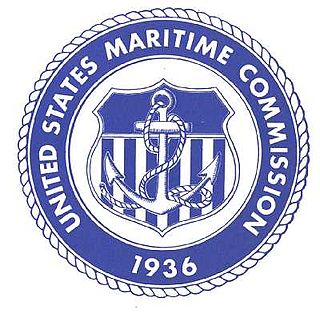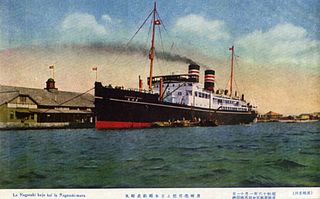Related Research Articles
Independent agencies of the United States federal government are agencies that exist outside the federal executive departments and the Executive Office of the President. In a narrower sense, the term refers only to those independent agencies that, while considered part of the executive branch, have regulatory or rulemaking authority and are insulated from presidential control, usually because the president's power to dismiss the agency head or a member is limited.

United States Merchant Marines are United States civilian mariners and U.S. civilian and federally owned merchant vessels. Both the civilian mariners and the merchant vessels are managed by a combination of the government and private sectors, and engage in commerce or transportation of goods and services in and out of the navigable waters of the United States. The Merchant Marine primarily transports domestic and international cargo and passengers during peacetime, and operate and maintain deep-sea merchant ships, tugboats, towboats, ferries, dredges, excursion vessels, charter boats and other waterborne craft on the oceans, the Great Lakes, rivers, canals, harbors, and other waterways. In times of war, the Merchant Marine can be an auxiliary to the United States Navy, and can be called upon to deliver military personnel and materiel for the military.

The United States Merchant Marine Academy is a United States service academy in Kings Point, New York. It trains its midshipmen to serve as officers in the United States Merchant Marine, branches of the United States Armed Forces and the transportation industry. Midshipmen are trained in different fields such as marine engineering, navigation, ship's administration, maritime law, personnel management, international law, customs, and many other subjects important to the task of running a large ship.

The United States Shipping Board (USSB) was established as an emergency agency by the 1916 Shipping Act, on September 7, 1916. The United States Shipping Board's task was to increase the number of US ships supporting the World War I efforts. United States Shipping Board program ended on March 2, 1934.

The United States Maritime Administration (MARAD) is an agency of the United States Department of Transportation. MARAD administers financial programs to develop, promote, and operate the U.S. Maritime Service and the U.S. Merchant Marine. Determining services and routes necessary to develop and maintain American foreign commerce and requirements of ships necessary to provide adequate service on such routes. In addition it conducts research and development activities in the maritime field; regulates the transfer of U.S. documented vessels to foreign registries; maintains equipment, shipyard facilities, and reserve fleets of Government-owned ships essential for national defense.
Its programs promote the use of waterborne transportation and its seamless integration with other segments of the transportation system, and the viability of the U.S. merchant marine. The Maritime Administration works in many areas involving ships and shipping, shipbuilding, port operations, vessel operations, national security, environment, and safety. The Maritime Administration is also charged with maintaining the health of the merchant marine, since commercial mariners, vessels, and intermodal facilities are vital for supporting national security, and so the agency provides support and information for current mariners, extensive support for educating future mariners, and programs to educate America's young people about the vital role the maritime industry plays in the lives of all Americans.

The Surface Transportation Board (STB) of the United States is a federal, bipartisan, independent adjudicatory board. The STB was established on January 1, 1996, to assume some of the regulatory functions that had been administered by the Interstate Commerce Commission when the ICC was abolished. Other ICC regulatory functions were either eliminated or transferred to the Federal Motor Carrier Safety Administration or Bureau of Transportation Statistics within DOT.

The United States Maritime Commission (MARCOM) was an independent executive agency of the U.S. federal government that was created by the Merchant Marine Act of 1936, which was passed by Congress on June 29, 1936, and was abolished on May 24, 1950. The commission replaced the United States Shipping Board which had existed since World War I. It was intended to formulate a merchant shipbuilding program to design and build five hundred modern merchant cargo ships to replace the World War I vintage vessels that comprised the bulk of the United States Merchant Marine, and to administer a subsidy system authorized by the Act to offset the cost differential between building in the U.S. and operating ships under the American flag. It also formed the United States Maritime Service for the training of seagoing ship's officers to man the new fleet.

The Merchant Marine Act of 1920 is a United States federal statute that provides for the promotion and maintenance of the American merchant marine. Among other purposes, the law regulates maritime commerce in U.S. waters and between U.S. ports. Section 27 of the Merchant Marine Act is known as the Jones Act and deals with cabotage. It requires that all goods transported by water between U.S. ports be carried on ships that have been constructed in the United States and that fly the U.S. flag, are owned by U.S. citizens, and are crewed by U.S. citizens and U.S. permanent residents. The act was introduced by Senator Wesley Jones. The law also defines certain seaman's rights.

The War Shipping Administration (WSA) was a World War II emergency war agency of the US government, tasked to purchase and operate the civilian shipping tonnage the United States needed for fighting the war. Both shipbuilding under the Maritime Commission and ship allocation under the WSA to Army, Navy or civilian needs were closely coordinated though Vice Admiral Emory S. Land who continued as head of the Maritime Commission while also heading the WSA.

The United States Federal Maritime Commission (FMC) is an independent federal agency based in Washington, D.C. that is responsible for the regulation of oceanborne international transportation of the U.S. It is chaired by Daniel B. Maffei.

The Emergency Fleet Corporation (EFC) was established by the United States Shipping Board, sometimes referred to as the War Shipping Board, on 16 April 1917 pursuant to the Shipping Act to acquire, maintain, and operate merchant ships to meet national defense, foreign and domestic commerce during World War I.

The United States Maritime Service (USMS) was established in 1938 under the provisions of the Merchant Marine Act of 1936 as voluntary training organization to train individuals to become officers and crewmembers on merchant ships that form the United States Merchant Marine per 46 U.S.C. § 51701. Heavily utilized during World War II, the USMS was largely dissolved in 1954, and its resources were absorbed into other federal departments. However, while the service is no longer structurally organized, remnants of the service still exist today and the service still actively commissions officers to function as administrators and instructors at the United States Merchant Marine Academy and the several maritime academies.

A shipping line or shipping company is a company whose line of business is ownership and operation of ships.
The maritime history of the United States is a broad theme within the history of the United States. As an academic subject, it crosses the boundaries of standard disciplines, focusing on understanding the United States' relationship with the oceans, seas, and major waterways of the globe. The focus is on merchant shipping, and the financing and manning of the ships. A merchant marine owned at home is not essential to an extensive foreign commerce. In fact, it may be cheaper to hire other nations to handle the carrying trade than to participate in it directly. On the other hand, there are certain advantages, particularly during time of war, which may warrant an aggressive government encouragement to the maintenance of a merchant marine.
The Merchant Marine Gallant Ship Citation is an award of the United States Merchant Marine. The award is presented as a bronze plaque to vessels, with officers and crew being awarded a ribbon bar to denote the award. Both United States flagged vessels and foreign flagged vessels are eligible for the award.
The United States merchant marine forces matured during the maritime history of the United States (1900–1999).
The Cargo Preference Act or Cargo Preference refers generally to legal requirements for the carriage of government-impelled cargoes on the vessels flagged within the registry of that government for the purpose of promoting a national merchant marine. Cargo Preference is commonplace among the world's seafaring nations, including Australia, Brazil, France, Japan, Taiwan.
John E. Jamian is an American businessman, former U.S. government official, and Michigan State Legislator. He served as deputy and later acting maritime administrator, the head of the U.S. Maritime Administration, an agency of the United States Department of Transportation, from 2003 until 2006. He was confirmed as deputy maritime administrator by the Senate on May 7, 2003 and became acting maritime administrator February 12, 2005. Prior to his service at the Maritime Administration, Jamian was elected to three terms in the Michigan House of Representatives from 1991 to 1996. From 1997 to 2001 he served as executive director of the Detroit/Wayne County Port Authority and from 2001 until his appointment as deputy director in 2003 as the executive director the Armenian Assembly of America. Between 2011 and 2015, Jamian resumed his role as executive director at the Port of Detroit. Since returning to private life in 2015, he has held the position of Chief Operations Officer for Troy, Michigan based AmeriCare Medical Inc. and continues to serve as the Armenian Assembly of America's State of Michigan Director.
The Maritime Labor Board (MLB) was an independent US government agency with responsibilities for mediating and researching US labor law in relation to labor disputes in the maritime industry. In 1941, its mediation function lapsed, after which it focused exclusively on research.
Transportation in the United States is governed by laws and regulations of the federal government. The Department of Transportation is responsible for carrying out federal transportation policy, and the Department of Homeland Security is responsible for security in transportation.
References
- ↑ "Our History". Federal Maritime Commission. Retrieved 2019-11-17.
![]() This article incorporates public domain material from websites or documents of the National Archives and Records Administration .
This article incorporates public domain material from websites or documents of the National Archives and Records Administration .
- Records of the Federal Maritime Commission. (See 358.2, Records of the Federal Maritime Board)
- United States Code, Title 15, Chapter 40: Department of Commerce